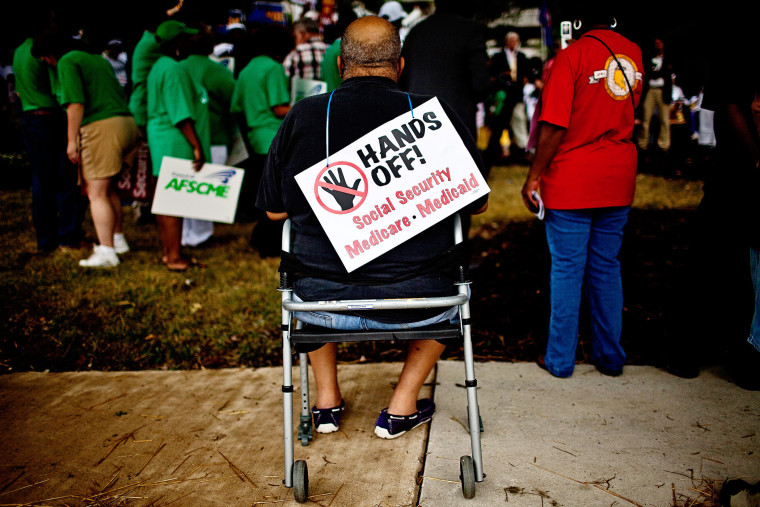At a campaign forum in Florida this morning, Republican presidential hopeful Mike Huckabee didn't sound like he's a big fan of Social Security, but he nevertheless characterized raising the retirement age as "political suicide."
It's a reasonable point -- as "reforms" to social-insurance programs go, raising the retirement age isn't popular, and candidates pushing the idea have to realize they're going to face public resistance.
But former Gov. Jeb Bush (R) is plowing ahead anyway, committed to his plan to increase the retirement age for Social Security eligibility.
"I think it needs to be phased in over an extended period of time," he said on CBS's "Face the Nation." "We need to look over the horizon and begin to phase in, over an extended period of time, going from 65 to 68 or 70," he added. "And that, by itself, will help sustain the retirement system for anybody under the age of 40."
Part of the problem here is that Jeb Bush, who really ought to know better given his work in Florida, is flubbing some of the details. Under the current Social Security system, to retire with full benefits a worker has to wait until he or she is 66, not 65. For Americans born after 1959, under current law, retirement at full benefits must be delayed to 67.
All of this may sound picky, but the details matter. Bush has had quite a bit of time to get up to speed on the policy, and the fact that he seems unsure about the current retirement age isn't a good sign. As Richard (RJ) Eskow noted this morning at the Huffington Post, "If you're going to cut a program which affects the lives of most Americans, the least you can do is get the facts right. Jeb didn't. That's worse than a candidate getting the price of bread or milk wrong, or a president's wonderment at the fact that grocery stores have scanners."
But even putting this aside, the policy itself is a mistake. After New Jersey Gov. Chris Christie (R) recommended a similar move, Vox's Matt Yglesias had a good piece on this:
The key thing to know here is that most people actually begin collecting Social Security benefits at the “early” retirement age of 62 rather than at the full retirement age, which is currently 66 but rising to 67. People who retire at 62 rather than 66 get smaller checks from Social Security, but most Americans do it anyway, because they need the money, hate their job, or both.Christie’s proposal isn’t just to raise the “full” retirement age to 69; he also says, “We need to raise the early retirement age at a similar pace — raising it by two months per year until it reaches 64 from the current level of 62.” In other words, Christie would actually change the age at which people start collecting benefits.As the average American’s life expectancy at 60 is about 21 years, this means Christie is effectively proposing an across-the-board benefit cut of almost 10 percent in Americans’ lifetime Social Security benefits. Except this is a particularly cruel and regressive form of cut, because life expectancy is longer for richer people. Inequality in life expectancy is also growing over time.
Economist Teresa Ghilarducci added recently, “Evidence shows that many older workers are simply not able to work past traditional retirement age without substantial suffering. Reducing their retirement income and throwing them off medical insurance will create a new cohort of impoverished elderly, reversing the tangible gains in reducing old age poverty made since the Great Depression."
